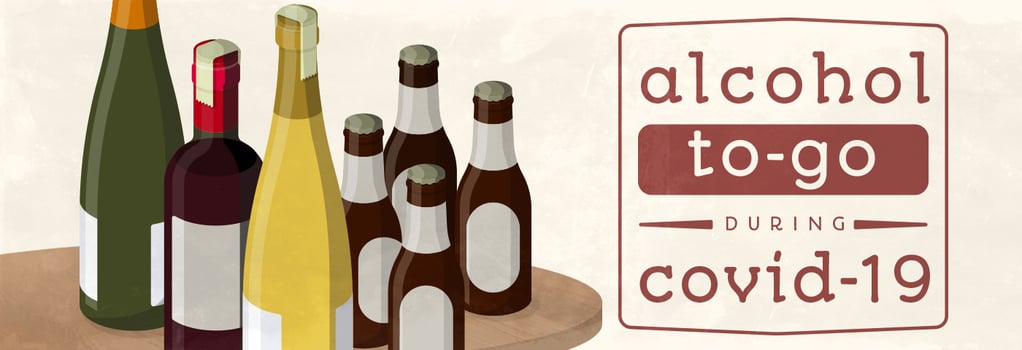
Alcohol To-go Laws to Keep Restaurants Open
The COVID-19 pandemic has hit the restaurant industry hard. Safer-at-home orders designed to "flatten the curve" continue to keep people inside, but independently owned restaurants often don't have the cash reserves needed to close for two months and then reopen. Many restaurants are trying to keep their doors open by swapping to curbside pickup and delivery business models, but state laws that prohibit alcohol delivery cause operators to miss out on a large chunk of profitability1 at a time when they can least afford it.
To help keep restaurants afloat,2 many states have temporarily relaxed their alcohol delivery laws, as well as the laws regarding having alcohol in cars. With these new regulations in place, restaurants can sell beer, wine, or cocktails with their meals, which broadens the potential profitability of delivery or to-go orders.
However, many states3 are also enacting regulations to ensure that restaurants don't end up being an alcohol delivery service. Most states mandate that food must also be purchased, with some specifying that the majority of the bill must be food, while some will allow beer and wine to be sold to-go but not liquor. Other states are not relaxing alcohol laws at all.
New Alcohol Laws
Most states are not changing who can sell alcohol; doing so still requires proper permits4 that will determine which types of alcohol any given establishment can sell. Below, you can learn more about some of the ways states are navigating temporary alcohol to-go laws to better understand where your business (or your favorite restaurant) may stand.
Curbside or delivery alcohol sales are permitted.
These states have chosen to raise restrictions on the sale of curbside or to-go alcohol for foodservice establishments that were already allowed to sell alcohol on the premises. All other regulations, such as the requirement that each seller must verify the age of the buyer, remain in place. Each state will have some specific requirements, but in general, these states are the most permissive and do not require food to be purchased alongside the alcohol.
Alcohol can be sold only in original, sealed containers.
These states have changed regulations to permit restaurants to sell the alcohol they could have sold in a dining room via delivery or to-go orders only if the alcohol is in its original, sealed container: beer in cans, wine in corked bottles, etc. Some states are allowing the sale of bottles that have been resealed with some sort of protection that would indicate whether the container has been opened. Consult the appropriate regulatory agencies for your state to see if tape over the cork in a wine bottle is sufficient sealing, for example. These regulations hope to prevent to-go customers from potentially drinking the beverages while driving; if they're sealed, law enforcement officers can tell whether the drink has been opened.
Alcohol may be sold alongside food purchases.
This iteration of relaxed rules specifies that alcoholic beverages may be sold either through delivery or curbside pickup but only alongside a purchase of food. Some states have specified that food must comprise a certain percentage of every receipt to ensure an order of fries isn't used to cover the purchase of several cases of beer. If your state already had regulations in place mandating that a certain percentage of your gross sales be from food, those are likely not lifted. State governments want to make sure that establishments are classified and licensed appropriately and that restaurants are not operating as bars.
Only wine or beer may be sold.
Some states only permit restaurants to sell wine or beer5 via delivery or to-go orders. Even if your establishment is allowed to sell cocktails on the premises, some states will not allow anything other than beer or wine to be sold through delivery or pick-up. Many states that require all alcohol to be sold in its original packaging disallow cocktails and hard liquors because they would have to be mixed to be sold and thus poured from their original packaging.
No alcohol to-go or deliveries are allowed.
Some states have not announced any upcoming changes to their alcohol to-go laws. If your state has closed dining room service and has not enabled delivery or to-go alcohol sales, you might be out of luck until stay-at-home orders are lifted. Consult your local restaurant association or state liquor board to see if any plans to loosen regulations are in the works.
Will Alcohol To-go Stick Around?
It's entirely possible that these loosened regulations will be revoked as soon as dining rooms are opened again, and it's equally possible that states don't experience any problems under the new system and move to make them permanent. Some states have notoriously strict drinking laws in place, while several cities already have forgiving open container laws and allow cocktails to be served in the drive-thru. No one really knows if these relaxed alcohol laws will have staying power once the nation resumes normal operations.
To stay informed as local and state governments continue to adapt to the ongoing crisis, check your local or state restaurant association website, your state department guidelines, and your local liquor board for the most up-to-date information.
Resources
- Liquor Laws Loosen Up in the Face of Delivery-Only Dining. Eater. Accessed April 2020.
- Coronavirus brings quick changes to state alcohol laws. The Hill. Accessed April 2020.
- New Alcohol To-Go Rules in All 50 States. The Foley Food and Wine Society. Accessed April 2020.
- Texas Joins States Allowing Restaurants to Sell Booze with Takeout or Delivery Food Orders. D Magazine. Accessed April 2020.
- States Boost Hospitality Industry With Booze Delivery and Takeout Sales. US News. Accessed April 2020.

